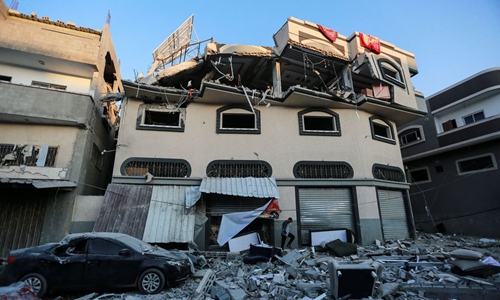HOME >> WORLD
Prospects for tension between Israel, Gaza remain uncertain despite ceasefire deal
Source:Xinhua Published: 2019/11/15 8:04:02

A Palestinian inspects the damaged house of Islamic Jihad leader Baha Abu al-Atta after an Israeli attack in Gaza City, Nov. 12, 2019. (Xinhua/Mohammed Dahman)
Prospects for escalation between Palestinian armed factions in the Gaza Strip and Israel remain uncertain, Palestinian observers said on Thursday.
Earlier on Thursday, the Israeli military and the Islamic Jihad in Gaza announced that an Egyptian-brokered cease-fire was agreed, ending three days of cross-border fire that claimed the lives of 34 Palestinians.
The violence was sparked by the killing of Islamic Jihad's senior commander Baha Abu al-Atta. A pair of Israeli airstrikes on his home in Gaza city killed him and his wife on Tuesday before dawn.
At least 450 retaliatory rockets launched by Islamic Jihad militants reached southern and central Israel, according to Israel's official army figures.
"It was Israel that started the escalation when it assassinated Abu al-Atta and the Palestinian factions responded according to agreed tactics to determine the extent and depth of their response," Gaza-based political analyst Adnan Abu Amer told Xinhua.
Abu Amer said it was apparent the Palestinian factions wanted a short round of escalation and not to roll into a comprehensive confrontation with Israel.
At the same time, he said, the factions also wanted to convey a message that they will always respond strongly to any Israel's assassinations of Palestinians.
"Israeli Prime Minister Benjamin Netanyahu sought to achieve cheap political gains through the escalation in Gaza. But the Palestinian factions made him to pay a heavy price after paralyzing daily life in Israel through their rocket attacks," he added.
Although both sides have committed to the declared ceasefire, an Israeli political source told Israel's Public Radio that the "situation on the ground will determine the course of action."
The source, who spoke on condition of anonymity, said Israel made no concessions, adding that "Tel Aviv would strike anyone who would attack it and had achieved all its objectives from the campaign."
Israel has already launched three large-scale military operations against the Gaza Strip between 2008 and 2014.
Gaza has seen about 15 rounds of tension with Israel since the end of the last large-scale Israeli offensive in Gaza in 2014, which left more than 2,000 Palestinians dead.
Abdel Majid Sweilem, a political observer from the West Bank city of Ramallah, said Palestinians believe that Netanyahu started this operation on Gaza to escape corruption charges in addition to his failure to form a government after Israel's recent elections.
He added that despite the relatively large number of rockets fired on Israel, these projectiles did not cause serious direct harm to Israel, "which is very important for the Israeli public."
In the recent round of tension, Islamic Jihad took the lead in firing rockets, while the Qassam Brigades, the armed wing of Gaza-ruling Hamas movement, did not fire any rockets on Israel.
A source close to Hamas, who spoke on condition of anonymity, told Xinhua that the Hamas is "tired of internationally-mediated truce agreements with Israel because of Israel's failure to abide by the agreements' conditions as well as the lack of guarantees to force Israel to commit to such agreements."
The source said that Hamas was already aware of Israel's intention to assassinate military and field commanders in the Gaza Strip to gain the confidence of the Israeli public, "which led Hamas and the other factions to use new tactics to deal with such emergency events."
According to the source, "this time Israel failed because of the new tactics of the Palestinian factions."
Meanwhile, political analyst Hossam al-Dajni from Gaza, said the joint operations room of the Palestinian factions has adopted a new military tactic in dealing with the current situation.
Al-Dajni explained that the field action is being carried out with "national consensus," noting that a new military tactic led by both Hamas and Islamic Jihad.
"This tactic was used to pressure Israel and exhaust it so the Palestinian factions can achieve political goals, the most important of which is ending the policy of targeted killing of Palestinian leaders and commanders as well as lifting the Israeli blockade on Gaza," the expert said.
He pointed out that Hamas did not emerge in the frontline so as to "have some room for negotiations and maneuvering through international mediators who want to contain the situation and restore calm in Gaza."
Posted in: MID-EAST